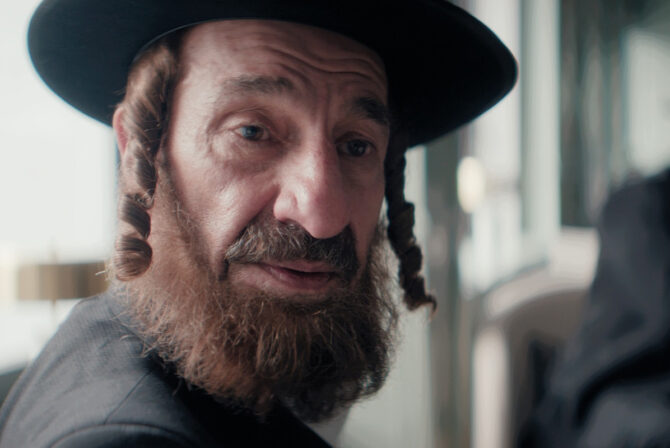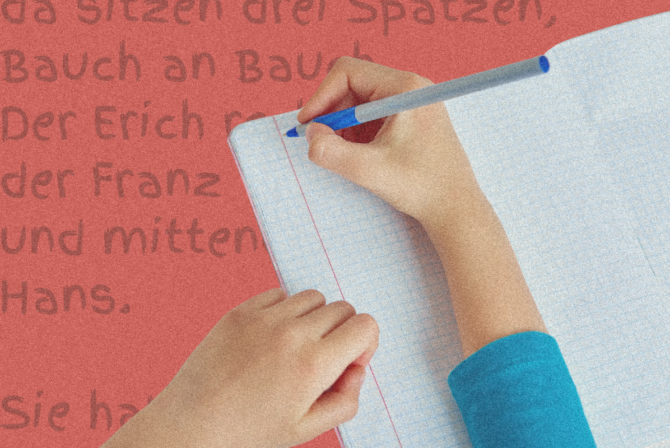Summer was ending, and the dreaded question slipped up on us again: where would we go for the High Holidays? Which was inevitably followed–-after the usual debate over rabbis, distances, and the chances of there being strange organ music–-by the next question: why go at all?
It had been easy in Park Slope, Brooklyn to find a community of Jewish parents and rollicking Tot Shabbat services without ever having to answer this question, or join a congregation. But in June we’d moved with our 2-and-a-half-year-old daughter, Sylvie, to Providence, Rhode Island. And as August turned into September, we found ourselves at a Friday night open house at a nearby Reform synagogue where everything had been set up outside. The night was warm, the people were friendly, and the barbecue was good. There was even a crafts table for the children.
Then the service began. We sat in the back, next to a family we’d recently met, agreeing that as soon as our kids got antsy, we’d leave.
Sure enough, as soon as the cantor started singing, the children stood up in their seats. Soon, I thought, they’ll start to whine, and we can all go off to the lawn on the other side of the synagogue, where the kids can play and the adults can debrief.
But there was no whining. Instead, as if on cue, the children started to dance to the blessings. They bent their knees, rocked their hips, chicken-winged their arms – but gently, as if they knew exactly where they were. Sylvie started to sing along with the cantor. She didn’t know most of the words, of course, she just copied them the best she could, her mouth wide open, her body swaying.
Sylvie sings loudly, so people turned to look, and I realized, if I were to see her from their perspective, that what she was doing on her folding chair would look like davening.
Feeling Uncomfortable
I began to feel uneasy. It was a familiar unease, one I’d felt last Halloween when Sylvie, dressed as a ladybug, ran through the streets of Park Slope pumping her fist in the air and shouting, “Shabbat Shalom!” I’d felt it at her naming, when instead of fussing at the foot-dipping ritual we weren’t entirely comfortable with ourselves, she giggled and cooed.
Sometimes I feel it when we make Shabbat at home, often with guests, who seem either amazed or bemused as Sylvie sings every word of the Hebrew blessings with us before exuberantly yanking the cover off the challah.
At first, I thought my discomfort was merely embarrassment. Sylvie’s demonstrations of devotion suggest that I am equally devoted. Sure, I was the one who’d started taking her to Tot Shabbat when she was 10 months old. But did she have to be so fervent about it?
At the open house, watching Sylvie sing and sway, her eyes filled with what I can only describe as zeal (!) I realized that my discomfort is more complex. It gives me great joy to hear Sylvie singing the words I grew up singing, and taking delight in the rituals I grew up delighting in. But it also makes me worry for her, because so many other aspects of Judaism have left me feeling estranged.
As a child, I took great comfort in going to synagogue. I loved the songs, the old people, the smell of the benches, the rabbi’s voice. But when I left home, and that particular, familiar congregation, the whole enterprise lost meaning.
 These days, I feel generally alienated by the language in the Siddur. I am uncomfortable with the idea of a chosen people. I don’t even like saying the word God. All of which makes me wonder: why are we introducing Sylvie to these songs and rituals? Aren’t they just going to lead to her own estrangement down the road?
These days, I feel generally alienated by the language in the Siddur. I am uncomfortable with the idea of a chosen people. I don’t even like saying the word God. All of which makes me wonder: why are we introducing Sylvie to these songs and rituals? Aren’t they just going to lead to her own estrangement down the road?
It’s a funny thing: to have spent so many years trying to “work out” my relationship with Judaism, and sometimes trying not to have one at all, only to find myself, once my daughter was old enough to crawl, heading straight back to synagogue.
One explanation is simple: I can’t help myself. As conflicted as I may be about praising the Lord, I am entirely certain when it comes to praising challah and Manischevitz. Keeping Sylvie from these pleasures, or from booing Haman, or dressing up as Esther, would be as strange to me as keeping her from eating noodles or jumping in leaves.
Then there’s my more cynical defense: Why not let her go crazy for the Shema? Isn’t childhood full of delusions? Isn’t that what makes it so much fun?
Do We Need to Warn Her?
But I wonder. Could there be a way to watch Sylvie belt out the blessings, even chant the haftorah at her bat mitzvah, without feeling that we’re putting her right back where we started – destined for disappointment?
We could warn her, of course. We could share our snarky thoughts with her, and visibly roll our eyes. Then she would be just like us, without having had to go through the love affair, and later the confusion. A fine approach – if it didn’t rob her of all pleasure. We could try a gentler tack. We could find a way to talk about our questions, our “serious doubts.” But that sounds exhausting, and like it would bewilder a child. It certainly bewilders us.
And maybe this is part of the problem. Maybe we’re complicating what could be simple, if we stopped trying to figure it out. Maybe, instead of working so hard to protect Sylvie from our own experience, we should open ourselves to hers. We, after all, are the ones who sit or stand in synagogue now and have no clue where we are. We focus on the cantor being too operatic or the siddurs too outdated because we are new to the synagogues, yes, but also because we are scared of just being there, not as Sylvie’s parents – thinking, figuring – but as ourselves.
What if we were to go as ourselves–-doubtful yet yearning, fearful yet proud – and try to see through Sylvie’s eyes? Maybe we would rediscover, at the root of our ambivalence, a simple curiosity. We might remember how much we still don’t know. We might even learn something, like the Jews at Mount Sinai, who accepted the Torah before they had a clue what it meant. “We will do,” they said, and then, “we will understand.”
It would be, as all parenting is, an interesting experiment. It would mean taking the radical step of worrying less about Sylvie and more about us.
Sylvie is 2-and-a-half, after all. She is fervent about nearly everything she does. After the Shabbat service, we let her loose on the synagogue lawn with her new friend and the two of them engaged, fervently, in another essential childhood ritual: running until you fall down.







